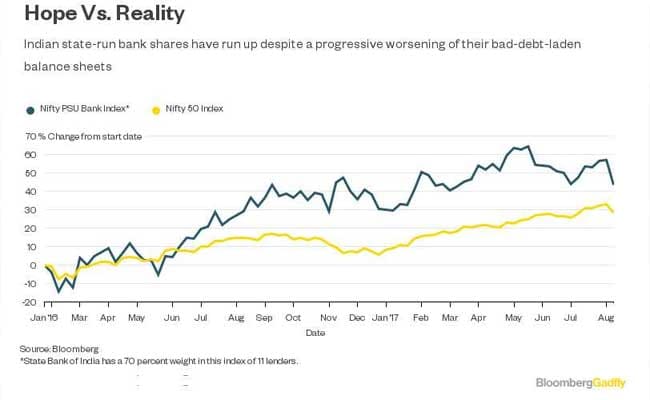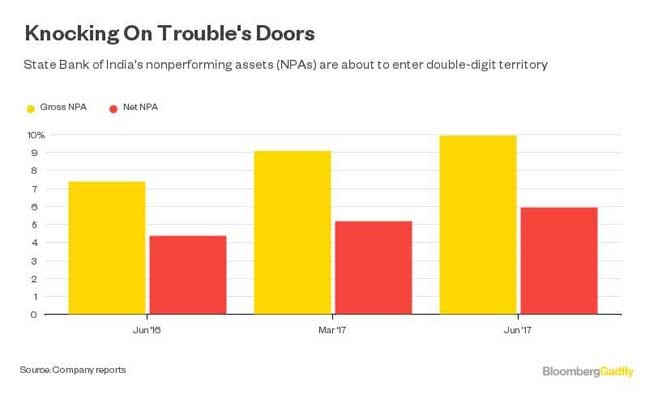It has. On Friday, State Bank of India, which just became bigger after a merger with some smaller associated lenders, reported a meager 1.5 percent increase in loans outstanding at the end of the June quarter from a year earlier, practically hitting stall speed.
To the extent that credit growth at SBI is a barometer of animal spirits in the country, the message to investors is a somber one. At a price-to-earnings ratio of 23, the benchmark Nifty index is expensive; and given that SBI just earned a return on assets of 0.25 percent, bank shares look particularly frothy.

If that wasn't enough, Bhattacharya was knocked off balance by the deposit tsunami unleashed by the government's move to declare 86 percent of the country's currency illegal in one fell swoop last November. A 4 percent year-on-year increase in deposit costs during the quarter, combined with an 8 percent decline in interest income on advances, shows the squeeze she's facing.
To her credit, Bhattacharya managed to boost consolidated earnings by 436 percent. But nobody is going to even look at the measly 20 billion rupee ($312 million) profit number when SBI has yet to provide for 300 billion rupees out of its 500 billion rupees exposure to 12 soured large corporate accounts.
SBI's exposure to 12 soured corporate accounts
500 billion rupees
To this, add a spike in SBI's nonperforming agricultural loans, which could get worse if more Indian state governments resort to waiving distressed farm debt. SBI shareholders, including the government, should brace themselves for a long, dark night ahead.

For a bank that gets 23 percent of India's domestic deposits without having to make much effort, not being able to lend profitably is frustrating. That's why SBI slashed rates on small savings recently without even waiting for the central bank to reduce its policy benchmark. By contrast, Kotak Mahindra Bank Ltd. jumped up and announced that it won't follow the SBI's lead because it values its relationship with the middle class.
Uday Kotak @udaykotak Borrowers matter so do savers. Kotak Mahindra Bank holds rates for savers upto 1 crore. 6% continues for saving between 1 lakh and 1 crore. Twitter: Uday Kotak on Twitter Lending is already toast. If the formidable deposit franchise also comes under pressure, then SBI will only exist as a parking lot for its 280,000 employees -- 70,000 more than before the merger. That'll make it the Air India Ltd. of banking -- a bloated state behemoth, minus the planes.
This column does not necessarily reflect the opinion of Bloomberg LP and its owners.
(To contact the author of this story: Andy Mukherjee in Hong Kong at amukherjee@bloomberg.net To contact the editor responsible for this story: Matthew Brooker at mbrooker1@bloomberg.net)
(Andy Mukherjee is a Bloomberg Gadfly columnist covering industrial companies and financial services. He previously was a columnist for Reuters Breakingviews. He has also worked for the Straits Times, ET NOW and Bloomberg News.)
Disclaimer: The opinions expressed within this article are the personal opinions of the author. The facts and opinions appearing in the article do not reflect the views of NDTV and NDTV does not assume any responsibility or liability for the same.
(Except for the headline, this story has not been edited by NDTV staff and is published from a syndicated feed.)


